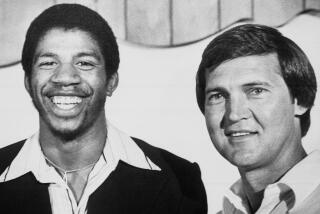CAMPUS CORRESPONDENCE : Can Magic Breach the Wall of Denial Students Built Around AIDS?
- Share via
University students too often behave as if they are invincible to the HIV virus.
When conversations turn to sex, as they frequently do on college campuses, the risks of contracting AIDS are seldom mentioned. University health officials at USC have, from time to time, tried to remind students about these risks. Safe-sex information and condoms are made available at AIDS-awareness promotions. And there are lectures on the virtues of abstinence, which are not taken very seriously. Generally, though, students remain dangerously passive in the face of the AIDS risk.
Magic Johnson’s disclosure that he has the HIV virus has helped to change that. The subject of AIDS is no longer ignored in sex talk at USC. Yet, it is still not regarded as the real threat it is. After Magic’s press conference, for example, I overhead students say, “I never would have imagined HIM to be a fag” or--my favorite--”We all gotta go sometime.” Such flippant remarks sadly mirror the responses of the Reagan and Bush administrations to the AIDS epidemic.
I suppose it follows that when our nation’s political leaders deal half-haphazardly with the AIDS menace, our concerns about the disease would reflect their attitude. Is there any excuse, for example, why funding for AIDS research was limited while two Republican administrations spent nearly a billion dollars in military aid to prop up a corrupt, authoritarian government in El Salvador? Is there any justification for bailing out a greed-driven savings-and-loan industry with taxpayer money, to the tune of $500 billion, while thousands and thousands and thousands of people have died of AIDS. These victims languished with little hope of any help from our political leaders--the people who were capable of providing financial support for better health care and research.
Without a doubt, such moral contradictions have undermined the public’s confidence in its national leaders and its desire to tackle the AIDS issue. We are daily bombarded with fears: of AIDS, of ecological destruction, of crime, of economic calamity. But politicians do little to alleviate our fears.
As a result, young people are maturing in a political environment that leads them to believe that this is the way it has always been; therefore, it is the way it must always be. Why should we bother getting mad when no one listens? In so doing, we have permitted AIDS to overtake us.
Magic’s announcement has helped to slow this process. It again brought the AIDS issue into public view, though it seems odd that the only way to get our country’s--and our universitys’--attention was to have a world-renowned athlete go public about his contracting the AIDS virus. Do I dare raise the question of what would have happened if the celebrity were a woman who had contracted the HIV virus from promiscuity, as Magic claims to have?
Yet, Magic did bring it all home to us. He has, once and for all, broken the stereotype of AIDS being a disease that exclusively strikes drug addicts and homosexuals. If even a hero of Magic’s stature is not immune, we--including college and university students--must acknowledge that we are vulnerable to the disease as well.
In paving the way for further debate and discussion on AIDS, Magic’s disclosure should also lead to a greater self-understanding of why our society seems to quickly forget and disregard such pressing issues as AIDS.
Still, with all the renewed media attention on AIDS, it would seem to follow that contributions, private and public, to AIDS-related research would dramatically increase. But let’s not bet on it. Let’s demand it.
More to Read
Sign up for Essential California
The most important California stories and recommendations in your inbox every morning.
You may occasionally receive promotional content from the Los Angeles Times.













